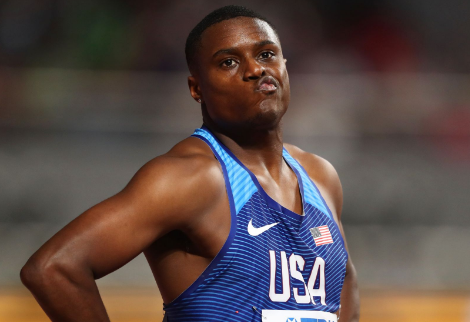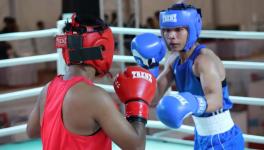World Champion Christian Coleman Banned for Two Years, Set to Miss Tokyo Games

Christian Coleman has been a repeat offender when it comes to missing dope tests and failing to adhere to the whereabouts clause.
The Athletics Integrity Unit (AIU) confirmed on Tuesday that the world 100 meters champion Christian Coleman has been banned for two years after he breached whereabouts rules. He will not be attending the Tokyo Olympics next year if the Games get staged that is.
Last year, the 24-year-old American was almost banned after he missed three dope tests. Coleman had justified that anti-doping officials did not follow procedure. And, as a result, he missed the tests. He, apparently, was out for Christmas shopping on December 9, 2019, when the dope officials attempted a test at his home. He had said he would be at home on the given day.
Also Read | It’s Scary Out There: The Unsafe Gaze in a Public Space
“I think the attempt on December 9th was a purposeful attempt to get me to miss a test,” Coleman had said after being charged in June this year. “Don’t tell me I ‘missed’ a test if you sneak up on my door – parked outside the gate and walk through... there’s no record of anyone coming to my place – without my knowledge.”
He added: “I was more than ready and available for testing and if I had received a phone call I could’ve taken the drug test and carried on with my night. I was only made aware of this attempted drug test the next day on December 10th, 2019 by the AIU when I got this failed attempt report out of nowhere.”
“I’ve been contacted by phone literally every other time I’ve been tested,” Coleman said. “Literally. (I don’t know) why this time was different. He even said he couldn’t hear the doorbell so why wouldn’t you call me?”
Following the counter argument, the US Anti-Doping Agency (USADA) withdrew the charges after seeking approval from the World Anti-Doping Agency (WADA).
Also Read | Sacking, Promotion, Celebration and Caution: Mohammedan Sporting’s Ghosts Refuse to Disappear
"We impose on the athlete a period of ineligibility of two years, which will end on May 13, 2022," the AIU said in a statement. "The decision may be appealed to the Court of Arbitration for Sport."
According to the rules, if a player fails thrice to properly file whereabouts information or is absent during the hours stated in a 12-month period, he or she can be suspended for one or two years.
His latest failure, however, has resulted in a ban and he will miss out on what would have been his prime years.
There are a couple of other high profile cases around whereabouts clause in the dope testing protocols. In one case, the athlete escaped without any sanction using a technicality while the other was banned for four years.
Salwa Eid Naser
In June, Salwa Eid Naser, who won the gold in the 400m event at the World Championships in Doha last year, was also suspended by the AIU after four whereabouts failures were registered.
In the case of Naser, her whereabouts failures happened between March 12 and April 12, 2019. She was not charged until June 2020, and she was allowed to compete in the World Championships in October 2019. She recorded a fourth whereabouts failure in January 2020.
However, she has been cleared of the violation by the World Athletics Disciplinary Tribunal, since the failures did not take place within a period of 12 months.
"This was a case very much on the borderline and we hope the athlete will learn from the experience and heed the AIU's warnings," the tribunal said in a statement at the time.
Wilson Kipsang
Earlier this year, former marathon world record holder, Kenya’s Wilson Kipsang, was handed a four-year ban for anti-doping rule violations including using a fake photo of a traffic accident as an excuse to not report his whereabouts -- one of his four violations.
According to the World Athletics, Kipsang, who won a bronze medal at 2012 Olympics, registered four whereabouts failures between April 2018 and May 2019.
The 38-year old Kipsang stated that he missed a test on May 17, 2019, because of a traffic accident and provided a photo of it. However, the image was from an accident that happened on August 19, 2019.
“The World Athletics Disciplinary Tribunal has banned long-distance runner Wilson Kipsang of Kenya for four years with effect from January 10, 2020 for whereabouts failures and tampering by providing false evidence and witness testimony,” the AIU said at the time.
“The athlete engaged in fraudulent and deceitful conduct by providing deliberately misleading and false information to the AIU in an attempt to obstruct and delay the investigation into his explanation and/or prevent normal procedures from occurring, namely the recording of a Missed Test against him,” the statement added.
Get the latest reports & analysis with people's perspective on Protests, movements & deep analytical videos, discussions of the current affairs in your Telegram app. Subscribe to NewsClick's Telegram channel & get Real-Time updates on stories, as they get published on our website.
























